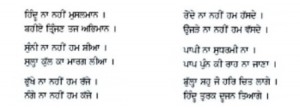By Kollengode S Venkataraman
The details of the life of Bulleh Shah, the 18th century freethinking Sufi poet of Punjab, are not precisely known. However, scholars have pieced together his life by triangulating the events he describes in his poems with the recorded history of the Mughals and the Punjab. There is consensus that he was born in Bahawalpur in 1680 and died in Kasur in 1757, both places in the Pakistani Punjab today.
In Bulla’s time, the Punjab region was in social, cultural and political turmoil, with Aurangazeb (1658-1707) in Delhi and with armed raids from the west by Nadir Shah and Ahmad Shah Abdali (1747–1773). The Sikhs suffered the most at the brutality of the Mughals and from violent incursions from their western borders. The Sikh’s history is one of the bloodiest in history, and we can not simply gloss over it. They were trying to reassert themselves, even as they were trying to reform the Sikh religion itself.
During this time, Sikhs’ 10th Guru, Guru Gobind Singh (1666- 1708) finalized the document Adi Granth or Granth Sahib, as their non-Corporeal Teacher for guidance on all matters of faith and personal conduct, on which rests today’s Sikh religion.
[A small, but necessary digression: It is necessary here to acknowledge the contribution of the Sikhs to India’s cultural history. There is a popular saying among the Sikhs in the Punjab:  “Khata Peeta Lahe Da, Baaki Ahmed Shahe Da,† literally meaning, “What you eat, drink and wear is yours, the rest is Shah’s.” The Shah the Punjabis refer to are Turkic and Afghani invaders from the West or the Mughal rulers from East from Dilli.  The Shah can be Ghazni, Ghori, Abdali, Nadir Shah or Timur; The Punjab bore the brunt of the these marauders’ raids. My Punjabi friends in Pittsburgh tell me that these invaders from their Western border a few centuries ago will harass the Punjabis men and women on their way to Delhi for their loot. And then, these marauders on their way back from Delhi, will once again harass and loot them on their way back. The Sikhs’ resistance to the Mughals (and other invaders) was persistent all through the centuries.  Even the mighty Mughals simply could not take their minds off the Sikhs on their Western front. This greatly helped India to preserve its pre-Islamic culture to varying degrees. The farther you go from Delhi towards east and south, the better is this preservation that we can see in old Chola-, Pallava-, Chalukya-, and Kakatiya-period temples that still stand and being worshipped in today’s Odisha, and throughout Southern India; and in the way performing arts (Odissi, Bharatanatyam and its derivatives, Karnatic Music, Keertan traditions … …) are preserved with very little influence from the Mughals. So, on this point, people living South of the Vindhyas owe a big Thank You to the Sikhs. ]Â
The well-documented violent strife in Mughal India was not only between Muslims and the Sikhs/Hindus in matters of faith, but also between Shia and Sunni Muslims for political control. The religious turmoil spilled over every facet of life. In this environment, probably because of the bigotry and fights over religious dogma and control, spiritual mysticism of the Sufis sprouted among Muslims. According to K S Duggal*, the Indian version of Sufism integrated elements of Islam, with the native Vedantic ideas and India’s Bhakti Movement.
* http://www.apnaorg.com/poetry/bullahn/Untitled/untitled.html
Growing up and living in this era, Bulleh Shah was disillusioned with the religious bloodletting as we see in this translation of his verse:
Going to Makkah is not the ultimate, even if hundreds of prayers are offered.
Going to Ganga is not the ultimate, even if hundreds of cleansings are done.
Going to Gaya is not the ultimate, even if hundreds of worships are done.
O Bulleh Shah, the ultimate is, when the “I†is removed from the heart!
The “I” the Bullah refers to is our ego.
In India’s “deep†south lived Shiva-vakkiyar in the Tamil country a few centuries before Bulleh Shah (14th century or earlier). Shiva-vakkiyar uses even harsher language against the religious orthodoxy in the context of the discord between the Vaishnavites and Saivites in his time. Here is an example of Shiva-vakkiyar’s alliterative, rhyming and easy flowing verse for those who can read Tamil.
Here is the non-literary translation:
Your God and our God — Really two are there?
Is not the Primordial One here, there, and everywhere?
When the Primordial One is here, there, and everywhere,
Let them rot and perish, those who differentiate!
So, the outpourings of the Free Spirits everywhere are to be seen in the time, place and context of their lives. In Bulla’s Punjab, Mughal rulers were trying to impose Islam – in any case, their version of Islam — on the Hindus and Sikhs against their will. Bulleh Shah’s disillusionment comes out clearly in the following lilting verse given in the Gurumukhi script for those who enjoy reading it in its original :
Translation:
Neither Hindu nor Muslim; giving up pride, let us sit together.
Neither Sunni nor Shia, let us walk the road of peace.
We’re neither hungry nor full, neither naked nor fully clad.
Neither weeping nor laughing, neither ruined nor settled.
We are not sinners, nor virtuous,
What is sin and what is virtue, this I do not know!
Says Bulla, “One who attaches his self with Hari*
Gives up both Hindu and Muslim.â€
* Important Note: Hari, the term often used by Kabir, Bulla, and many other Hindu/Sikh poets refers to the nameless, formless, all-pervading Infinite One (or nirguna brahman in Sanskrit), and is not limited to the Puranic Hari.
If Bulleh Shah or Shiva-vakkiyar were in today’s US, in all likelihood, they would have composed liltingly alliterative verses needling those Yahudis (Jews) and Issais (Christians) like Kentucky’s Republican David Williams and Alabama’s Republican Gov. Robert Bentley and others, who claim exclusive pathways in mankind’s spiritual quest.
Acknowledgment: Ms. Manjit Kaur & Mr. Surinderjit Singh of Monroeville and Mr. Anterpreet Singh of Punjabi Kavita website for their help in getting Bulleh Shah’s verse in the Gurumukhi script.  ï®


